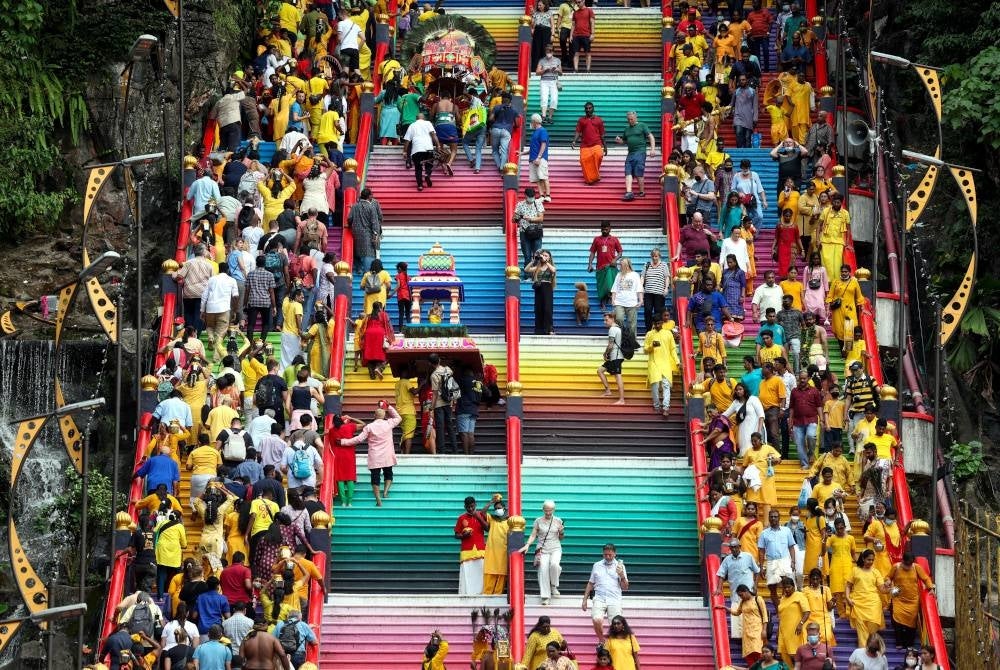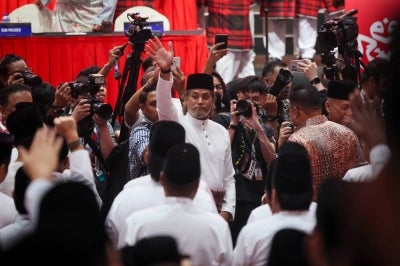Understanding the beauty of Thaipusam

Devotees at the Batu Caves temple - FILE PIC
This may come as a surprise to many, but the world's biggest and most colourful Hindu religious festival is celebrated on a grand scale only in Malaysia, not in India.
Other places in Malaysia that hold this celebration are Arulmigu Balathandayuthapani Temple in Penang and Kallumalai Arulmigu Subramaniyar Temple in Ipoh, Perak.
A sea of people clad in yellow attire throng these temples throughout the week leading up to Thaipusam day, to say their thanks and pay deeds to Lord Muruga, every year without fail.
Let us look into why is Thaipusam is celebrated? Just like in any other Indian ethos, this Hindu festival, celebrates the conquering of good over evil.
The speciality of this celebration is that it is known as the "festival of the tenth moon" since the word Thaipusam breaks down to "Thai," meaning "ten," and "Pusam," meaning "full moon day" or "Purnima."
On this special day, people in honor of Lord Muruga try to become a better version of themselves by doing penance and worshipping the deity. It is believed that this will help them lose their anger, hatred, and greed.
The origins of this celebration can be traced back to ancient Hindu scriptures where Lord Muruga was fighting a brutal demon called Soopradaman who took over the three realms of the universe, which were heaven, earth, and hell.
The situation turned bad when he took all the gods hostage. The demons were said to be torturing and tormenting them so badly. It is then that Goddess Parvathi contained all her powers in a spear and gave it to her son. He defeated the demons with her spear, thus restoring peace and harmony in the universe.
The festival, which is associated with sacrifice and penance, might appear scary, gory, and gruesome to a lot of people, but each form of the penance paid has its own meaning to the individual who pays it.
The most common offerings are milk, honey, "sandhanam," or sandalwood, or any fruits that are yellow or orange, as it is said to be Lord Muruga's favourite colour which explains the choice of attire adorned by devotees for the holy celebration
.
There are also many types of Kavadis; 'Idumban Kavadi'; pots filled with milk and suspended on rods carried on the shoulder, 'Mayil Kavadi'; similar to Idumban kavadi except that it is decorated with peacock feathers, 'Pal Kavadi"; a metal pot filled with milk and carried on one side of the shoulder only.
Pal Kavadi: a metal pot filled with milk and carried on one side of the shoulder only; Pushpa Kavadi: a pot filled with milk and carried on the head.
Many devotees are also known to shave their heads on the occasion of their answered prayers.
For me, the Thaipusam celebration is very personal, I wasn't made aware of the meaning of it until I was much older. My father, who is a spiritually strong person, has always turned to God for strength, peace, happiness, and even in hard times.
And for that reason alone, we frequented Batu Caves's Sri Bala Thandayudabani Temple every year without fail.On the eve of Thaipusam, my parents would rush back from work, get the four of us ready, and leave to see and be graced by Lord Muruga.
My parents made it a point for us to seek Him out in times of sadness, sorrow, and difficulties. And just as said by them, He has always worked his magic in my life. It has been 30 years since, I'm a wife and mother now, and I still diligently follow my parents advise.
Other things we look forward to are the colourful display of kavadis, echoed by the trance-like chants of the devotees, and the rhythmic sound of the drums, bells, and other instruments. The air is filled with an amazing sweet smell of milk, incense, and devotion.
Following in my father's footsteps, I too now pray, vow, and pay penance regularly. In the 30-days of fasting before Thaipusam, I only eat vegetarian meals, often pray, and devote myself more to spiritual activities; like going to the temple and taking part in 'anadhanam' which means the act of donating food to those in need, and many more.
I have also involved my children in this religious customs, where they, too, will be vegetarian. This is great because we can go meatless most days of the week, not just in the month of Thaipusam, without having withdrawal symptoms.
My son, like his father, waits for Thaipusam not only to seek Lord Muruga for blessings but also to watch the parade of kavadis, ranging from big to small, lighted by colourful lights and flares, which is accompanied by special drum music.
As Malaysians, we are blessed that the Hindus here are able to practise our religion of choice and conduct prayers that are special to us without hindrance. With the support of our leaders, government, and other bodies, we have been able to celebrate Thaipusam without any restriction or limitation.
My friends, who are Chinese and Malays, have also found the celebration unique and have asked me to take them to Batu Caves for them to witness and experience the celebration.
They were awed by the colourful festival and enjoyed all the free vegetarian food and sweets, as well as the masala chai or tea given by devotees.
Without any prejudices, my friends were excited to know and learn about my culture, which earned them and their upbringing a lot of respect. Because of friends like that, I teach my son to respect all religions as they all teach us to be good and do good.
As such, I hope everyone, regardless of race, religion, or creed, respects each one of us as we are uniquely Malaysian!
Download Sinar Daily application.Click Here!














